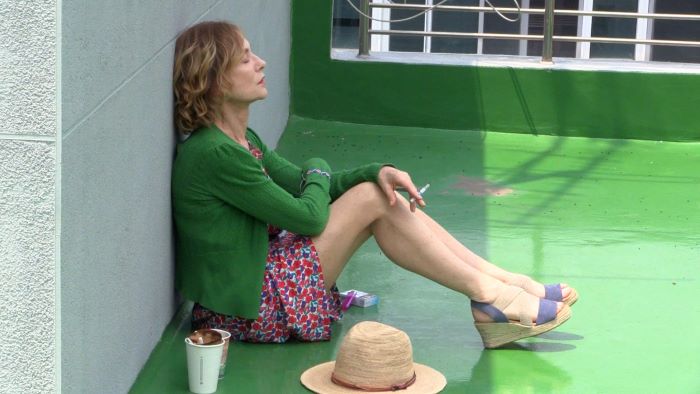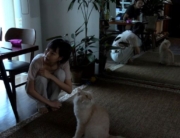A Traveler’s Needs, the 32nd feature by prolific South Korean auteur Hong Sang-soo, may initially appear light and airy, but it’s actually a witty, playful meditation on the virtues of engaging with art—in this case, poetry and music—featuring an intriguingly enigmatic central character. The enigma at the heart of the film, Iris, is portrayed by the iconic French actress Isabelle Huppert in her third collaboration with Hong, following In Another Country (2012) and Claire’s Camera (2017). As in those previous films, Huppert brings a uniquely destabilizing energy, adding fascinating new layers to Hong’s narratives, which are often anchored in self-confessional moments shared over food and drink.
The film’s first two sections revolve around Iris conducting “French lessons” for South Korean students. The word “lessons” warrants quotation marks, as Iris’s approach to language instruction is anything but conventional. In the first session, Iris meets with Isong (Kim Seung-yun) in the young woman’s apartment. After exchanging pleasantries in English, Isong performs a piece on the piano. Once she finishes, Iris asks how Isong felt while playing. Isong initially responds that she felt “happy” because of the “beautiful melody,” but Iris pushes her to reflect more deeply. After some persistence, Isong admits to feeling frustrated by what she perceives as her inadequate piano skills. At the end of the session, Iris writes down some French phrases on a notepad and instructs Isong to record herself reciting them on cassette.
Iris elaborates on her unconventional teaching philosophy in a session with a married couple, Haesoon (Kwon Hae-hyo) and Wonju (Lee Hye-young). Wonju expresses skepticism about the absence of a textbook in their lessons, prompting Iris to explain that language is more meaningful when tied to personal connections rather than the standard, mundane scenarios found in books. Amusingly, Iris admits to her lack of formal teaching experience, confessing she devised this method only a few months ago. “I hope it works!” she cheerfully quips. Their session involves little actual French instruction. Instead, the trio converse in English while sharing snacks and makgeolli, a milky Korean rice wine that Iris openly admits is her favorite—she confesses to consuming two or three bottles daily. Later, Wonju plays her guitar, leading to a conversation with Iris that mirrors Iris’s earlier discussion with Isong, including the same feelings of frustration over perceived inadequacy.
In the film’s final section, we discover that Iris is living with a young man, Inguk (Ha Seong-guk). The exact nature of their relationship is left ambiguous, though it’s clear Inguk is drawn to Iris. The two first met when Iris was clumsily playing a recorder in a park, a scene that serves as both a playful parody of romcom meet-cutes and a continuation of the motif of musical performance.
Isabelle Huppert is a charismatic and delightful presence, traveling (as the title suggests) through each encounter with a pixie-like energy. Her portrayal of Iris, clad in a green cardigan, sundress, and straw sun hat, cuts a striking figure. Remarkably, despite Iris having no defined backstory or clear future, Huppert’s effervescent, committed performance renders her a fully realized and compelling character.
As for whether Iris’s language instruction methods are legitimate or merely an improvised money-making scheme, Hong provocatively suggests that this question may not matter. While the film is titled A Traveler’s Needs, this particular traveler seems to provide everyone she meets with what they truly need: a deeper understanding of themselves, their connection to art, and their lived experiences.



Leave A Comment